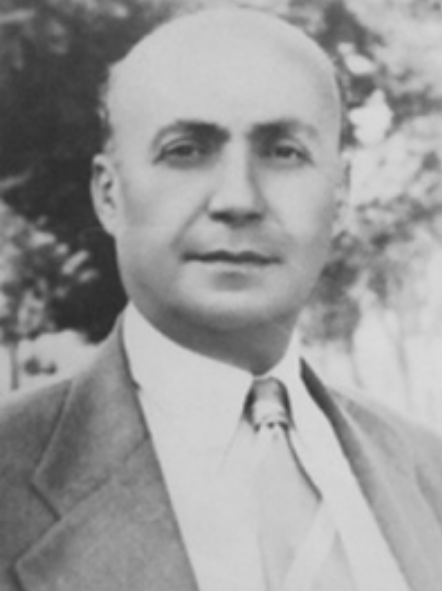Dr. Jorge Elías Francisco Adoum (Kafr-Shbeil, Lebanon, March 10, 1897 – Rio de Janeiro, Brazil, May 4, 1958) was a Lebanese-born Ecuadorian writer, translator, and practitioner of natural medicine. Known by the pen name Mago Jefa, he authored over forty volumes on esoteric topics, including occultism, Freemasonry, and gnostic traditions. A Grand Master Rosicrucian and 33rd-degree Freemason, Adoum was also renowned for his healing practices, employing techniques such as hypnotism and suggestion. His works, including Poderes (1940) and Del Sexo a la Divinidad (1952), earned him a lasting reputation in Latin America’s mystical and spiritual circles.
Dr. Jorge Adoum, also known as Mago Jefa, was a Lebanese-born Ecuadorian writer, translator, natural medicine practitioner, and esoteric thinker. Born on March 10, 1897, in Kafr-Shbeil, near Byblos, Lebanon, he emigrated to Ecuador in the 1920s, where he became widely known for his work in occult sciences and alternative medicine.
Early Life and Education
Jorge Adoum was born into a Catholic-Maronite family during the late Ottoman Empire. His childhood was marked by the hardships faced by Christians under Ottoman rule, which eventually led to his emigration. Though little is known about his formal education, his works suggest a deep early interest in religion, particularly the Druze faith and other Eastern traditions.
He claimed to have worked as a secretary to Emir Faisal of Syria during World War I. However, following personal difficulties and political turmoil, he fled Lebanon for France. There, Adoum studied natural medicine, focusing on fields such as hypnotism and suggestion.
Move to Ecuador and Literary Career
In 1924, Jorge Adoum emigrated to Ecuador, seeking refuge after a difficult period of political unrest and personal hardship in Lebanon. He had faced persecution for his nationalist activities and fled to France before eventually arriving in South America. Upon arriving in Ecuador, he struggled with health issues, including a misdiagnosis of tuberculosis, and economic difficulties.
Despite these challenges, Adoum turned to his expertise in natural medicine, which he had studied during his time in France, along with his passions for writing, painting, and music composition. He gained recognition for his esoteric and theosophical works, which dealt with mystical and spiritual themes. His early publications, including Poderes (1940) and Adonay (1942), helped establish his reputation in Latin American esotericism.
Personal Life and Beliefs
After settling in Ecuador, Adoum married Juana Auad Barciona, a fellow Lebanese emigrant, and together they had five children, including Jorge Enrique Adoum, who would later become a renowned Ecuadorian writer.
Jorge Adoum’s relationship with his son, Jorge Enrique, was complex and distant, particularly during Jorge Enrique’s childhood. According to biographer Rodolfo Pérez Pimentel, Jorge Enrique described his father as a strict disciplinarian who was emotionally distant and absorbed in his esoteric studies. He required his children to participate in weekly rituals, where they donned ceremonial robes and engaged in readings, leaving them confused and disengaged. However, as Jorge Enrique grew older and moved to Chile, the relationship improved, and the two reconnected on more amicable terms, with Jorge Enrique describing their bond as friendlier later in life.
Adoum also became a Grand Master of the Rosicrucians and held the 33rd degree in Freemasonry, incorporating these beliefs into his writings, which explored themes of inner power, spirituality, and hidden meanings within religious texts.
Esoteric Works and Legacy
Jorge Adoum’s works span more than 40 volumes, covering occultism, Freemasonry, and gnostic thought. Among his best-known books are Cosmogénesis, La Magia del Verbo, and La Zarza de Horeb. His book Del Sexo a la Divinidad was translated into English and remains a key text on sacred sexuality and religious initiation.
After 1945, Adoum expanded his influence through extensive travels in Chile, Argentina, and Brazil, where he attracted many disciples. His influence persisted in the esoteric community, and his books continue to be reprinted in Spanish and Portuguese.
Death and Legacy
Jorge Adoum died of a cerebral hemorrhage in Rio de Janeiro on May 4, 1958, at the age of 61. He was buried in Petrópolis, Brazil, where he is remembered as “Jefa el Venerable”. His works remain influential in the mystical and occultist communities, especially in South America.
Selected Works
- Poderes (1940)
- Adonay (1942)
- Las Llaves del Reino Interno (1941)
- La Zarza de Horeb (1943)
- Cosmogénesis (1945)
- Del Sexo a la Divinidad (1952; first English edition as From Sex to Divinity, translated by Monica D. Rocha, 2013; second edition as Sex to Divinity with footnote commentary, 2021).
References
- Goodreads, “Jorge Adoum.” Retrieved on October 11, 2024. Click to view.
- Rodolfo Pérez Pimentel, “Adoum Jorge Elías Francisco.” Retrieved on October 11, 2024. Click to view.
- Wikipedia, “Jorge Elías Adoum.” Retrieved on October 11, 2024. Click to view.
- Masonica.es, “Jorge Adoum.” Retrieved on October 11, 2024. Click to view.
- Weiser Antiquarian Books, “From Sex to Divinity by Jorge Adoum.” Retrieved on October 11, 2024. Click to view.

